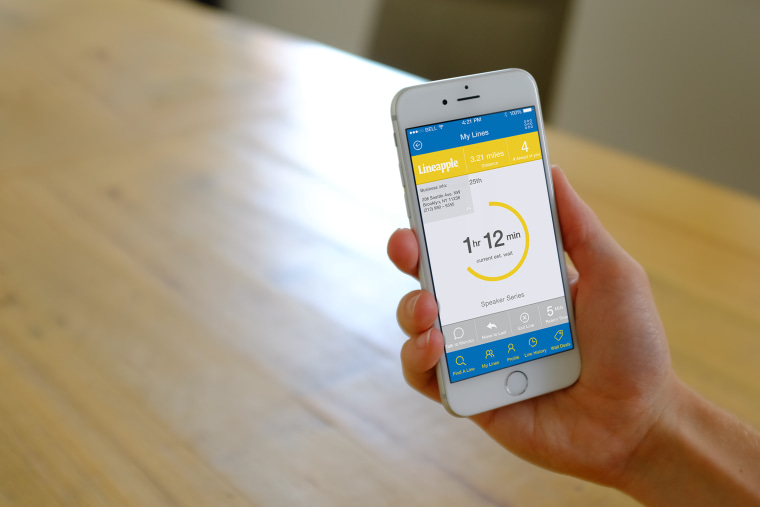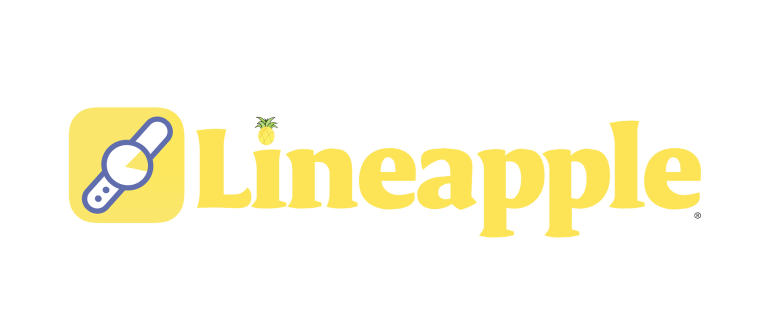As technology continues to rapidly change the global economy, could waiting be the next consumer experience set for a revolution?
That’s the idea behind Lineapple, a mobile app that replaces physical lines with a virtual queue, thus allowing customers to wait for service from anywhere. NBCBLK sat down with the company’s co-founders, Hans Mayo, Danielle Jones, and Dwayne Williams, to learn more about Lineapple, mobile waiting, and diversity in the tech industry.
What exactly does Lineapple do, and why can it help both consumers and retailers?
Hans Mayo: Lineapple lets you wait online — not in line — using our apps. Lineapple was built to let you skip waiting in lines at places like retailers, events, doctors’ offices, service centers, and, frankly, any place with a long line that’s not Disney. It also allows businesses to better know you and reward their customers with a perk, similar to what the airlines have successfully used — skipping lines with priority boarding.
Danielle Jones: Lineapple does this by turning your phone into an advanced mobile buzzer. Lineapple also has a wait with friends feature so you can invite your friends to share your spot and keep your friends in the loop using Facebook or text as well.

"Environmental networking" is one of the core concepts behind your product. What exactly do you mean by that and why do you believe it is so important?
Hans Mayo: Social networks connect people to other people. Environmental networking connects environments. Lineapple is a hybrid of the two. Lineapple connects you to a different environment, even if you aren't there. You can be active in two environments with Lineapple, just like Facebook lets you connect to friends who are not right in front of you. You can be shopping and still connected to the checkout counter, or you can be home and be digitally waiting for an event or doctor through Lineapple.
Where is Lineapple currently being deployed successfully? What are some businesses or industries that you believe Lineapple can impact soon?
Danielle Jones: Lineapple’s most well-known user is UCLA for NCAA games. We also work with other colleges and universities, businesses, and are in talks for large retail deployments this year.
Hans Mayo: Lineapple will greatly affect the retail industry. In an analyst report, Deloitte stated that companies closing business locations are going to cause capacity issues. Lineapple will allow businesses to end non-revenue producing waiting and improve the customer experience for their visitors. We haven’t seen one company that couldn't use this type of technology in some way.
What are some of the challenges that minorities face in the tech industry?
Hans Mayo: The tech space is a highly competitive space for any race. So, if you come to play, you need to be the best. When talking to [venture capitalists], minorities must apply the “two times” better rule of past generations. If you are not at least two to three times better than the next guy, you won’t get a chance to fail with a check, like the Instagram guys did. They will say, “network effect,” “get more users or revenue,” or tell you “the market isn’t large enough,” even though they just backed a guy last month without a [minimum viable product] even out. They aren’t going to guide you through your career like a lost son. If you are a minority, they will only back you if you are great. You should know that upfront.
Dwayne Williams: Most of the problems facing minorities in tech are internal, which is why Paul Graham [a computer programmer and venture capitalist] believes so strongly in pattern matching. A minority in tech must have the presence to lead people of all races. Building a corporation is hard work. You will need the proper support structure to build a company that will have $100 million in revenue. Our team understood this is a two-year process of setting up an impactful business, not a two to three-month process. Most of our family thought it should be a three-month process or questioned why we were leaving a corporate job for a tech startup. You need to surround yourself with people who understand this isn’t a dry cleaner — this is creating a company that will continue to delight people with great products for years to come.

What can be done to combat some of these challenges?
Hans Mayo: Don’t see color. The people who have helped us the most have been of all colors, and we also have people of other races on the Lineapple team. We are an international company. If the next person who is right to lead the company is another race, then the company will hire them. Lineapple isn’t about race, but it understands it.
Dwayne Williams: You need to work to be fundable and have a large network. Only bring quality to the table and realize a great app means nothing if it looks horrible. Invest in great design.
How has Lineapple evolved over time, and where do you see it heading in the future?
Dwayne Williams: Lineapple started off as a user-focused application and not a business-focused application. We noticed we had a great understanding of our personal users, however, there was a disconnect with the business owners. We realized that waits and congestion at a business were the business’ job to fix, and they weren't going to fix it unless we found a way to generate more revenue for them in the process, which we did. We redesigned the app to be more business-focused and started getting positive feedback from owners and enterprise companies.
Hans Mayo: Lineapple also built the first ever wait search engine. In the next five years, Lineapple will change the way you do everything. Before someone leaves their home, they will check Lineapple via their smartphone, smart watch, game console, or connected car interface to check the wait times at nearby places they wish to visit.
[This interview has been edited and condensed for clarity]